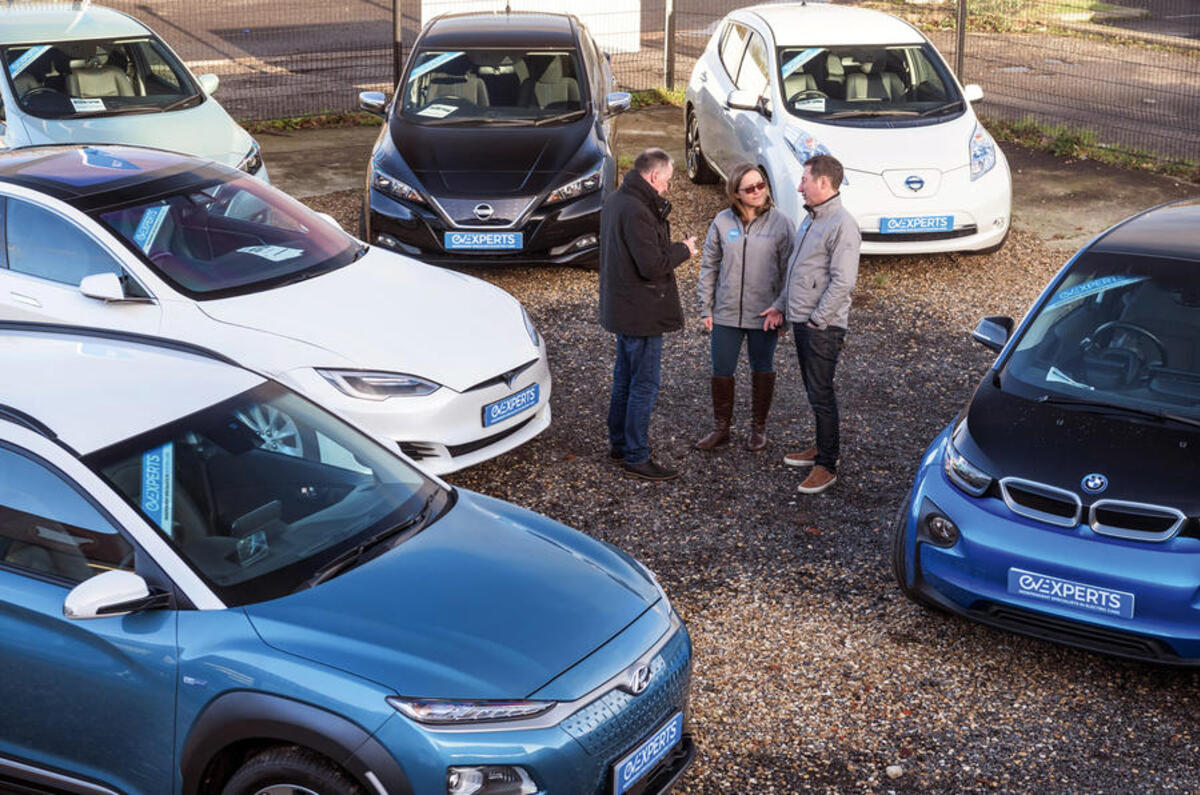Sales of second-hand electrified cars are on the rise in the UK, according to the latest figures from the Society of Motor Manufacturers and Traders (SMMT).
Despite a slight year-on-year overall decline in used car sales last quarter (largely the result of a boom this time last year as dealerships opened post-lockdown), the popularity of used electric and hybrid cars continued to grow.
A total of 14,182 plug-in hybrids changed hands last quarter, a 43.3% year-on-year rise, while sales of pre-owned battery-electric cars surged 56.4% to 14,990 units - the highest quarterly tally on record.
The SMMT attributes the hikes to "an ever-growing choice of new zero-emissions models coming on sale, for both new and used car buyers". Overall, plug-in cars now account for 1.4% of the used market, up from 0.9% this time last year.
Meanwhile, conventional petrol and diesel powertrains continue to dominate the market, accounting for 96.4% of all second-hand car transactions last quarter, although demand for each declined by 6.9% and 7.6% respectively, in line with a wider downward trend in the used market.
A total of 2,034,342 used cars changed hands last quarter, 134,257 fewer than in the same period last year. The SMMT notes that figures were particularly strong in the third quarter of 2020, however, as the easing of lockdown measures had "the market bounce back strongly".
The South East of England was the busiest region for used car sales, with 292,049 taking place, followed closely by the North West, West Midlands and East. Scotland recorded 166,941 used car sales, while 107,315 cars changed hands in Wales.
SMMT CEO Mike Hawes noted that record sales in the second quarter cancel out the recent decline, so "the market remains up year to date".
But he added: "Given the circumstances, with the global pandemic causing a shortage of semiconductors needed to produce new vehicles, undermining the new car market, used transactions were always going to suffer too. This is particularly worrying as fleet renewal – of both new and used – is essential if we are to address air quality and carbon emissions concerns."








Join the debate
Add your comment
This is doing extraordinary things to residual values. I bought a Mitsubishi Outlander PHEV two years ago. If I bought the same car today it would cost me more, despite being two years older and having another 15,000 miles on the clock.
The percentage increases look impressive. However, the actual numbers of used PHEV and BEV cars sold are still low.
I still believe the following about most, if not all, of the BEVs currently on sale:
Therefore, despite the current concerns about petrol and diesel prices and availability (in the UK, at least) and the plans to stop sales of new ICE cars from a certain point, I am not sure that most drivers should or will move to BEVs this side of 2030. There are too many variables.
Absolutely right. You would be insane to buy a new electric car with your own money. I suspect that almost all of them are bought on PCP or contract hire, especially as company cars, as they make a lot of sense.
All it takes is for one major battery innovation to come along, and your 2021 EV, is going to look like a Ford Anglia.
Indeed. Arguably, the BMW i3 and i8 are good examples of how residual values of PHEVs and BEVs can soften or keep falling significantly becuse of (a) changes in technology or consumer demands and (b) perceptions of the car-maker and whether it is losing ground to rivals for "electrification". Admittedly, the I3 has a quirky design and is not as practical as rivals but its "pedestrian" range makes it a difficult sell. The i8 seems to be an expensive car to fix and maintain, which does not help with residuals.
That said, looking at some of the more recent BEVs launched over the last two years, it is interesting that many car makers have not learned the lesson from the i3 about avoiding quirky designs.
The cheapest i3 on auto trader is a 2014 with 77k miles for £12.5k. Cheapest BMW 320d (similar list price) with the same age and miles is £10k. I3 depreciation doesn't look bad to me in that context. There is a lot of cobblers talked about EV tech and battery life on these pages. Time will tell, but I think the smart money (as well as the money of people who give a toss about the world) is in EVs now. There will be no more of a sea change in battery tech over the next 10 years than there has in ICE in the last 10. Does the fact that most affordable new cars have three cylinder turbo engines now prevent someone from buying a 10 year old 4 cylinder normally aspirated car in their price range? Of course not.
RE Autotrader car ads:
RE EV battery tech:
So, although the "smart money" might well be in EVs, the path ahead for car makers and car buyers will be interesting and perhaps uncertain at times.
Good news if you already have one or are in the process of buying new. But it would not encourage me to buy used: why pay an inflated price for a secondhand inferior spec model?
Just wait until supply matches demand and the bargains will surely return!